Thank you to Lenka Cathersides for the following research.
William Golding was born about 1870 in Kensington, London to painter William sr. and cook Mary (nee Healey).
William’s father William sr. was born in the 4th quarter of 1841 in Marylebone, London to mason’s labourer John, born about 1801, and laundress Bridget, born about 1803, both in Ireland. His mother Mary (nee Healey was born about 1842 in Marylebone, London to bricklayer’s labourer Michal Healey, born about 1800 in Ireland, and Bridget Healey, born about 1811 in Ireland. William and Mary Healey married in the 2nd quarter of 1865 in Marylebone.
The couple had two known children: John born about 1866 in Paddington, London and William born about 1870 in Kensington.
At the time of the 1871 Census, the family lived at 11 Farmer Street, Kensington. William was working as a painter and Mary was looking after their children John and William.
At the time of the 1881 Census, the family lived at 4 Kents Place, London. The family comprised of wharf labourer William, cook Mary and their sons: unemployed labourer John and William. The family further comprised of William sr’s nephews: John and Herbert J.Tory.
William married Mary Ann Griffiths in the 3rd quarter of 1890 in Marylebone. Mary Ann was born about 1871 in Paddington to parish labourer James, born about 1826 in Ireland, and Mary, born about 1833 in Limerick, Ireland.
William and Mary Ann had three known children: John was born about 1897; Herbert born about 1899 and Kate born about 1901, all in Paddington.
At the time of the 1891 Census, the family lived at 15 Torrington Mews, Paddington. William was working as a carman and Mary Ann was at home.
At the time of the 1901 Census, the family lived at 29 Conduit Mews, Paddington. William was still working as a carman and Mary Ann was at home looking after their children John, Herbert and Kate. The household further comprised of Mary Ann’s mother, the widowed, Mary A. Griffiths.
At the time of the 1911 Census, the family lived at 3 Desborough Street, Paddington. William was working as a builder’s labourer and Mary Ann was looking after their children: page boy John, Herbert and Kate. The accommodation had one room. Mary Ann stated that she had given birth to five children, of whom three were still alive.
At the time of the 1911 Census, William’s parents William and Mary lived at 15 Glengall Road, Kilburn, London. William was a retired painter and Mary was at home. Mary stated that she had given birth to three children of whom two were still alive. The accommodation had one room.
William Golding enlisted in Clapham on 26th April 1913 into the Surrey Yeomanry (Queen’s Mary Regiment). His regimental number was 1692 and he was a Trooper. At the time of his enlistment William was working as a coachman and lived with his wife and children in Paddington.
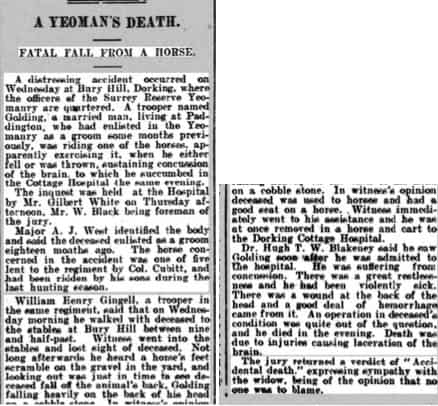
A Yeoman’s Death
FATAL FALL FROM A HORSE
A distressing accident occurred on Wednesday at Bury Hill, Dorking where the officers of the Surrey Reserve Yeomanry are quartered. A trooper named Golding, a married man, living at Paddington, who had enlisted in the Yeomanry as a groom some months previously, was riding one of the horses, apparently exercising it, when he either fell or was thrown, sustaining concussion of the brain to which he succumbed in the Cottage Hospital the same evening. The inquest was held at the Hospital by Mr. Gilbert White on Thursday afternoon, Mr W. Black being foreman of the jury.
Major A. J. West identified the body and said the deceased enlisted as a groom eighteen months ago. The horse concerned in the accident was one of five lent to the regiment by Col. Cubitt and had been ridden by his sons during the last hunting season.
William Henry Gingell, a trooper in the same regiment said that on Wednesday morning he walked with the deceased to the stables at Bury Hill between nine and half past. Witness went into the stables and lost sight of the deceased. Not long afterwards he heard a horse’s feet scramble on the gravel in the yard, and looking out was just in time to see deceased fall off the animal’s back. Golding falling heavily on the back of his head on a cobblestone. In the witnesses opinion deceased was used to horses and had a good seat on a horse. Witness immediately went to his assistance and he was at once removed in a horse and cart to the Dorking Cottage Hospital.
Dr. Hugh T. W. Blakeney said he saw Golding soon after he was admitted to the hospital. He was suffering from concussion. There was a great restlessness and he had been violently sick. There was a wound at the back of the head and a great deal of haemorrhage came from it. An operation in deceased’s condition was quite out of the question and he died in the evening. Death was due to injuries causing laceration of the brain.
The jury returned a verdict of “Accidental death” expressing sympathy with the widow, being of the opinion that no one was to blame.
Dr. Hugh T. W. Blakeney said he saw Golding soon after he was admitted to the hospital. He was suffering from concussion. There was a great restlessness and he had been violently sick. There was a wound at the back of the head and a great deal of haemorrhage came from it. An operation in deceased’s condition was quite out of the question and he died in the evening. Death was due to injuries causing laceration of the brain.
The jury returned a verdict of “Accidental death” expressing sympathy with the widow, being of the opinion that no one was to blame.
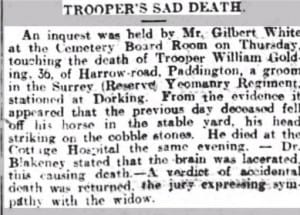
Trooper W. Gingell from the same Regiment said that on “Wednesday morning he walked with deceased to the stables at Bury Hill between 9 and half-past. Witness went into the stable and lost sight of deceased. Not long afterwards he heard a horse’s feet scramble on the gravel in the yard, and looking out was just in time to see the deceased fall off the animal’s back, Golding falling heavily on the back of his head on a cobble stone.”
He died at the Cottage Hospital the same evening from a brain laceration. Dr Hugh T. W. Blakeney said that he saw Golding soon after he was admitted to the Cottage Hospital. Golding was suffering from concussion, was restless and had been violently sick. There was a wound at the back of his head with considerable haemorrhaging. An operation in the deceased’s condition was out of question.
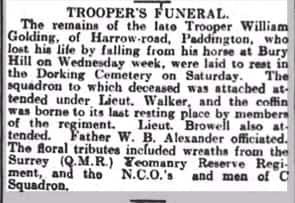
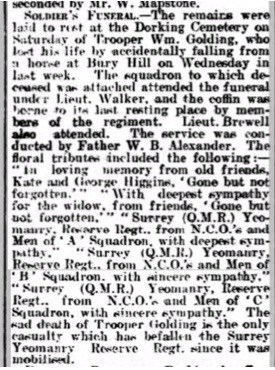
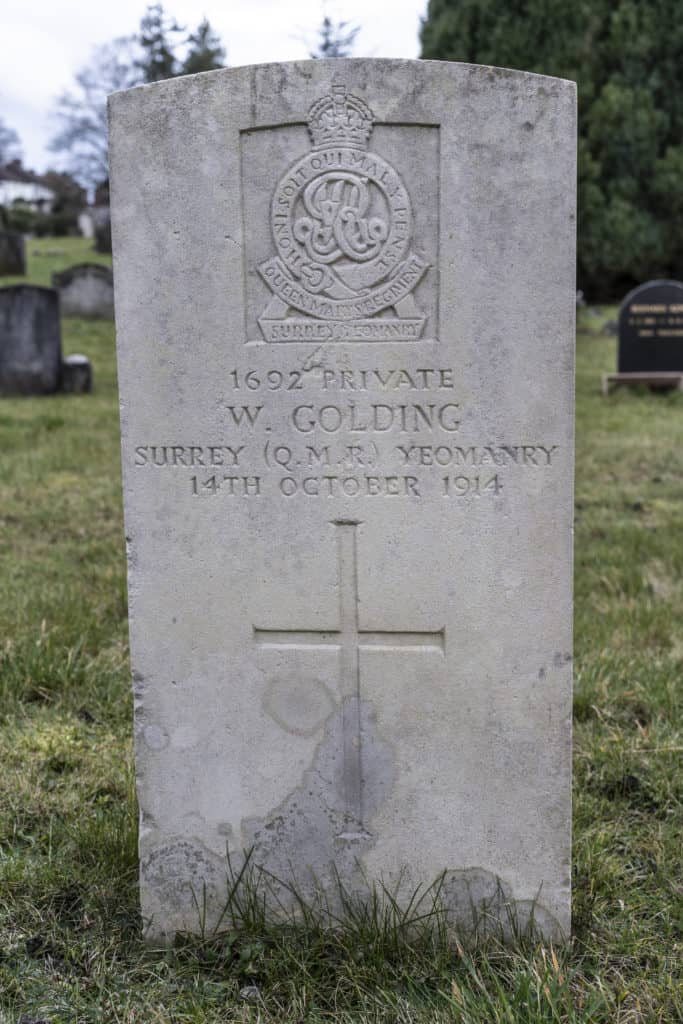
Photograph courtesy of Lois Leyland
His funeral was held at Dorking Cemetery on the 17th of October 1914. His grave reference number is: R.C.42. The squadron to which deceased was attached was present at the funeral, under Lieutenant Walker, and the coffin was borne to its last resting place by members of the regiment. The service was conducted by Father W.B. Alexander.
His widow Mary Ann Golding of 12 Stratham Street, Harrow Road, Paddington received £1, 10s and 6d on the 21st of June 1915 in Soldier’s Effects.
| Born | Paddington, London | |
| Son of | William and Mary. A Golding of 12, Streatham Street, Harrow Road, London | |
| Husband of | Mary Ann Golding (nee Griffiths) | |
| Father of | John, Herbert and Kate Golding | |
| Enlisted | Clapham, London | |
| Regiment | Surrey Yeomanry (Queen Mary’s Regiment) | |
| Number | 1692 | |
| Date of Death | 14th October 1914 | |
| Place of Death | Dorking Cottage Hospital | |
| Cause of Death | Falling from a horse at Bury Hill | |
| Age | 36 | |
| Cemetery | Dorking Cemetery |

